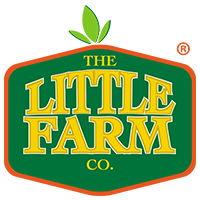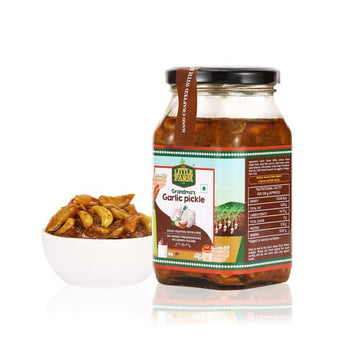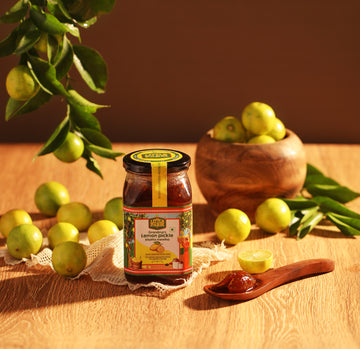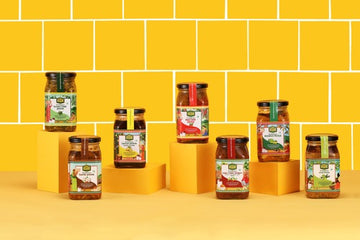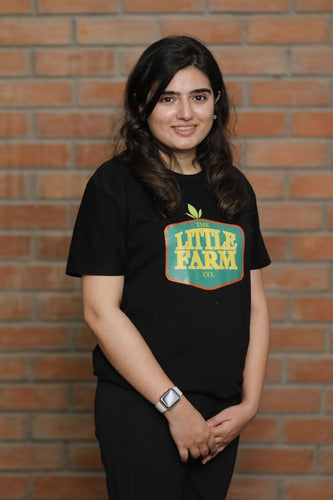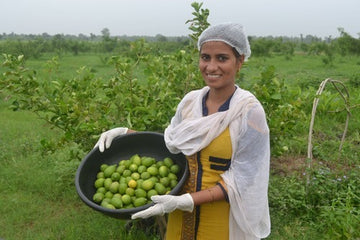What are the Environmental impacts of Indian pickle production? Is it sustainable? Is pickle production good for the environment?
Indian pickles, also known as achar, are a staple in Indian cuisine and are loved for their unique flavor and taste. But what many may not realize is that the production of Indian pickles also has several positive environmental impacts and is indeed a sustainable food choice. In this article, we will explore the various ways in which the production of Indian pickles can contribute to a greener and more sustainable future. Pickles in our culture is a tale as old as time and here is everything you should know about why that is.
Here is a simple run-through to better understand the environmental impact pickles have and what to look into to understand it better.
You will learn about the environmental consequences of Indian pickle production as well as how to make more sustainable food choices.
After knowing pickles are beneficial or harmful for you, the environment you will be able to make the best food selections possible the next time you go grocery shopping.
Did you know which one is out fan's favourite pickle? It is Gobhi Gajar Shalgum Pickle
Conserving Water ResourcesWater is a finite resource, and its conservation is essential for a sustainable future. While the production of Indian pickles does require some water, it can also play a role in conserving water resources. By utilizing efficient irrigation methods and recycled water, pickle production can help reduce the strain on local water sources and conserve water for other uses.
Using natural preservatives such as vinegar or lemon juice also helps conserve water resources. These preservatives are highly effective and do not require large amounts of water in the preservation process. They are also safer and more sustainable options, as they do not contain harmful chemicals.
Waste Reduction and Management
Waste management is a critical aspect of sustainable food production. The production of Indian pickles generates some waste, but it can also play a role in reducing waste. By properly managing the organic waste generated during the production process, pickle production can minimize the amount of waste that ends up in landfills.
Using the organic waste generated during pickle production as fertilizer for crops reduces the need for chemical fertilizers and improves soil health and fertility. This not only contributes to a more sustainable food production system, but also reduces the amount of waste that ends up in landfills. Furthermore, natural preservatives such as vinegar or lemon juice eliminate the need for packaging or containers made from synthetic materials that are not biodegradable, reducing the overall amount of waste generated.
Eliminating Chemical Usage
The use of chemicals in food production can have significant impacts on both the environment and human health. Store bought pickles usually have chemical preservatives which is a huge concern, but it can also be avoided. By utilizing natural preservatives such as vinegar or lemon juice, salt, cold pressed oils, and sun drying we can avoid high chemical usage.
Natural preservatives such as vinegar or lemon juice do not contain harmful chemicals and are highly effective in preserving pickles. By using these preservatives, the need for artificial preservatives and chemicals is eliminated, reducing the impact of chemicals on the environment and human health. In addition, avoiding the use of pesticides reduces the amount of chemicals in the environment, preserving wildlife and the ecosystem.
Reducing Greenhouse Gas Emissions
Greenhouse gas emissions are a leading contributor to climate change, and reducing their impact is vital for a sustainable future. Pickle production can play a role in reducing greenhouse gas emissions by utilizing sustainable transportation methods. This includes low-emission vehicles, cycling, or walking to transport pickles from the production site to the market. In addition, utilizing renewable energy sources for pickle production, such as solar or wind power, helps reduce greenhouse gas emissions from energy production.
Supporting Local Economies
The production of Indian pickles often takes place in small-scale operations and supports local economies. By purchasing locally produced pickles, consumers can help support local businesses and reduce the carbon footprint associated with long-distance transportation. Additionally, locally produced pickles are often made with locally sourced ingredients, reducing the need for imports and supporting local farmers and suppliers. This is a key reason why supporting such businesses and buying pickles that are healthy is a good choice for one’s body and the economy.
But wait, there's more!
5 things to keep in mind when going food shopping:
- Local purchasing decreases transportation emissions.
- Food without packaging minimizes waste and carbon footprint.
- Refrigerated and frozen meals contribute to increased carbon emissions.
- Seasonal meals minimise greenhouse gas emissions (greenhouse gases)
- Growing plant-based foods at home is the most ecologically friendly way, leaving no carbon imprint.
How to make more sustainable food choices?
By this time, it is evident how sustainable pickles are!
It is important to stay aware of our food choices in a world where everything that comes to our plate from all across the globe.
Pickles are fermented, rich in nutrients and work as a probiotic which is why it amounts as a sustainable choice for the body. Since it's produced sustainably too, it is also good for the environment.
In order to live a healthy and sustainable lifestyle, we need to realise how vital it is for us to include nutritious foods in our everyday meals and there is no better way to do so than including a delicious spoonful of Indian pickles to our meal.
Make a sustainable food choice for you and your family from our latest collection at Products – The Little Farm Co.
Conclusion
In conclusion, the production of Indian pickles is not only delicious, but it also has several positive environmental impacts and is a sustainable food choice. It is a good source of probiotics to include in your everyday meal and is also a sustainable choice to make for your environment. Most of the time we make food choices without fully being aware of its consequences and this article aims at exactly tackling that.
